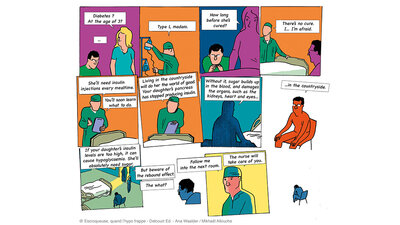Listening to diabetic patients
With a patient advisory board, Air Liquide Healthcare designs personalized support
Published on September 13, 2024
4 minutes

Animating patient advisory committees to invent new personalized services
“If you take 100 people with Type 1 diabetes, you’re looking at 100 different variations of the disease.” Those are the words of Sofia Segersson. The new forum includes 54 patients living in Sweden, with ages ranging from 17 to 30, all of whom have Type 1 diabetes.
In recent years, technology has made giant strides in helping to manage the condition with more advanced connected devices. Such technologies, together with the appropriate training and support, help improve patients’ clinical results and outcomes. While this is good news and often liberating for them, an aspect may be going largely untreated: their emotional wellbeing and how it can affect their diabetes management. Sofia Segersson comments: "A patient may meet a physician perhaps once or twice a year. But what we need is not just ‘how are you?’ but more ‘how are you, really?’This need can be particularly acute when a young adult leaves paediatric care and, possibly, the daily support of parents. To transition from child to adult in the healthcare system can be a lonely experience.”
What is the role of the Patient Advisory group?
This Patient Advisory Board is a concrete example of an initiative of Air Liquide Healthcare to start the design of new solutions with the people who will benefit from it. To give them the time and space to share their stories, their needs, and their ideas beyond what is typically discussed by medical stakeholders, their clinical data related to glucose levels for instance. They can explore what their pain points are and together suggest a solution to fix them based on experiences, expectations, disease expertise.

“It is really important that the patient’s voice is being properly listened to. As patients, we are the experts!
”
What we need is not just ‘how are you?’ but more ‘how are you, really?
Co-building and measuring health outcomes of personalized diabetes support
Discussions with advisory committees have enabled Air Liquide Healthcare to identify the need for personalized support for people with T1D entering adulthood. This transition period calls for hitherto unidentified psychological support to cope with:
- a constant “desire to feel normal” and an increased risk of depression (~15% of T1D teens experience depression1, almost twice the age range)
- changes in diabetes symptoms when getting older (e.g. takes longer time for blood sugar levels to raise than before, different dosage needed)
- the Burden of self-management at school then at work
Members of the advisory committee will be involved in the design and implementation of the new service: what are the keys to better accept the disease at this pivotal time? How can we encourage autonomy and responsibility? Which communication channels should be favored? What indicators should be measured and how?... This new program is designed to provide young adults with the resources they need to make progress in managing their disease. Once the new personalized service has been deployed, the collection of testimonials and health data (PROMs and PREMs) will enable the new service to be methodically evaluated before its wider roll-out.
Personalizing to better empowering
Personalization means offering diabetes treatment support tailored to the individual, rather than treating each person with a model identical to that of another patient.
At Air Liquide Healthcare, our holistic approach to the patient enables us to offer personalized support. These person-centered home healthcare services are essential to the patient's autonomy, by aiming to improve adherence to treatment and to reduce the risk of complications and/or hospitalization, thus alleviating costs for the healthcare system.
We are convinced that we can contribute to better outcomes through the deployment of personalized care solutions.
Air Liquide Healthcare is supporting IDF Europe to bring together patients, healthcare professionals, policymakers and healthcare system experts to discuss the necessary transformation of healthcare systems and promote personalized care. The summary of the symposium organized on the occasion of EASD 2024:
- What does personalisation of care mean and what is needed to drive this?
- Getting to know healthcare system users, how do you make a science of it?
- Transforming and standardising healthcare systems for optimal care personalisation
References
1. A randomised controlled trial of cognitive behaviour therapy and motivational interviewing for people with type 1 diabetes mellitus with persistent sub-optimal glycaemic control: A Diabetes and Psychological Therapies (ADaPT) study.



